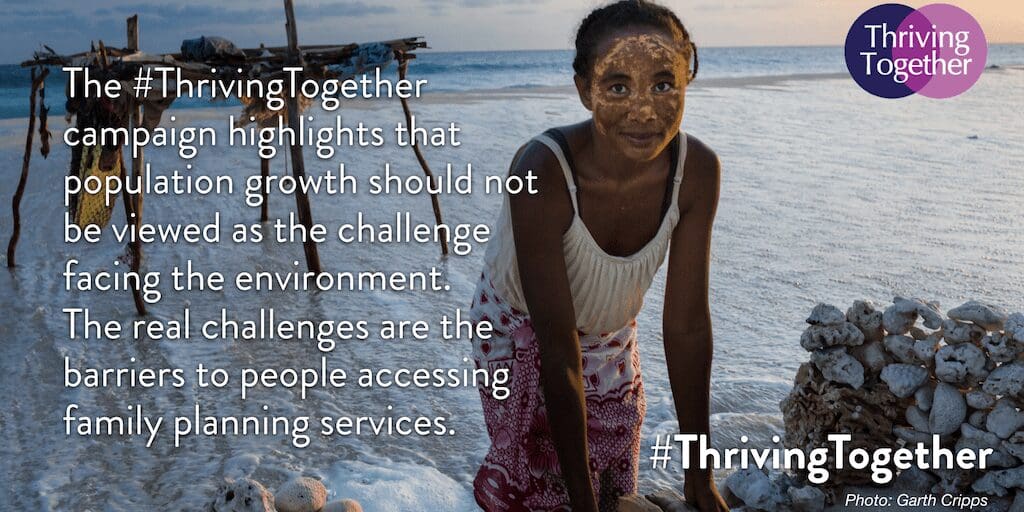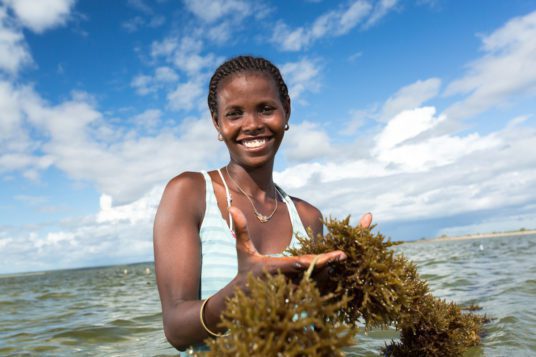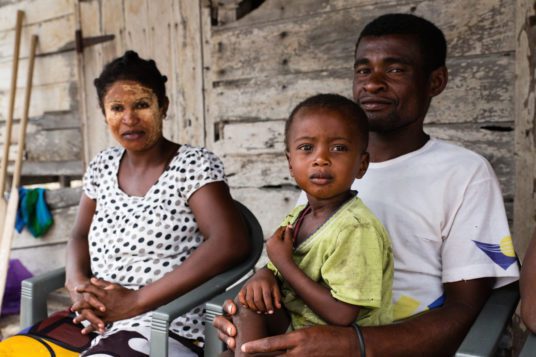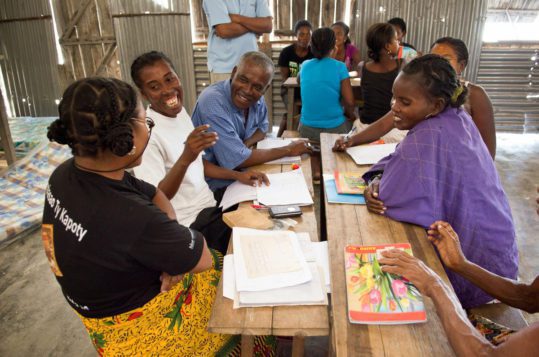Today, on World Population Day, Blue Ventures joins 150 leading conservation and health organisations to pledge support for a taboo-busting campaign called Thriving Together.
The signatories of Thriving Together are a diverse global alliance – from Conservation International, The Nature Conservancy and the Wildlife Conservation Society to Marie Stopes International, Pathfinder International and FHI 360 – all united by the agreement that improving access to family planning services is critically important for both communities and the environment.

After more than ten years of working at the intersection of health and conservation, it’s encouraging and exciting for everyone at Blue Ventures to see the value of cross-sector collaboration being recognised by environmental organisations and family planning providers alike.
Thriving together
The campaign’s report published today acknowledges how population dynamics help to set the scale and shape of the environmental challenges that we face as a society. It highlights how unmet family planning needs create unintended pregnancies which in turn place avoidable demand on natural resources.

It argues that enabling every individual to choose freely the number, timing and spacing of their births should be an uncontroversial and integral component of biodiversity conservation projects – particularly in areas where people are having more children that they would choose because they lack access to family planning services. The benefits are multifold: improved maternal and infant health, synergies with women’s economic empowerment and livelihood diversification, and fewer unintended pregnancies which in turn may support the long-term sustainability of biodiversity conservation efforts.
Many signatories of Thriving Together are putting these principles into practice by implementing rights-based initiatives that integrate family planning and other health services with local natural resource management efforts.
We have witnessed first-hand how removing barriers to family planning can empower communities to thrive alongside the ecosystems upon which their livelihoods depend. This is why the Thriving Together statement endorses cross-sector partnerships as a valuable development approach.
Barriers to family planning are not only relevant to those who are passionate about improving health, gender equality, empowerment and economic development, but also to those who are passionate about the conservation of biodiversity, the environment and sustainability.
David Johnson, Chief Executive of the Margaret Pyke Trust, who is spearheading the Thriving Together campaign and co-authored the associated report
A more complicated picture
Yet Blue Ventures’ research paints a more nuanced picture of the realities faced by fishing communities in the coastal tropics. We have found that increased access to family planning services is greatly appreciated by community members at our programme site in southwest Madagascar. They appreciate being able to choose the number, timing and spacing of their births; indeed, the local name for the service is ‘Safidy’ which means ‘choice’ in Malagasy. But fewer unintended pregnancies isn’t necessarily leading to reduced demand on natural resources, at least not in the short term.

The missing dimension here is consumption. A couple in southwest Madagascar is unlikely to sit back and relax if they choose to have three children instead of five. They may decide to use the free time gained from fewer childcare responsibilities to go fishing more often so that they can provide better for each of their children.
In a context of extreme poverty these families are understandably trying to increase their consumption levels from a very low baseline. This should be welcomed from an equity and poverty alleviation perspective. But it also means that even if people choose to have fewer children with increased access to family planning, their demand for natural resources may not significantly decrease in this context – at least not in the immediate term.
This insight highlights the importance of providing support for environmentally sustainable livelihoods as part of any integrated family planning and biodiversity conservation initiative. It also serves as a reminder of the urgent need to tackle unsustainable consumption patterns in the global north.
Family planning is not an environmental panacea… Connections between human behaviour and biodiversity are complex and not perfectly understood. Clearly resource consumption – both local and remote – plays a role.
Excerpt from the Thriving Together report, written by Robert Engelman & David Johnson of the Margaret Pyke Trust
Equity concerns
Addressing unmet family planning needs is immensely important from a human rights perspective and it can indeed help to ease demand on natural resources over the long term. But there’s a risk that emphasising the environmental benefits of family planning can place unreasonable expectations of change on people in the global south – the very same people who are most vulnerable to the impacts of climate breakdown. There’s also a risk of diverting attention from the critical need to curtail consumption in the global north.

Behaviour change is hard. It’s understandably tempting to focus on drivers and fixes to the world’s environmental challenges that avoid the need for personal and immediate behaviour change. Yet ecological collapse is being driven in large part by inequitable and unsustainable consumption patterns. Of course population dynamics affect the scale and shape of the environmental challenges we face. But those with the greatest distribution of global wealth also need to transition to lower-impact lifestyles right now in order to avert climate breakdown.
Movements towards reducing individual meat consumption, air travel and plastic waste are steps in the right direction. From school strikes to non-violent direct action, people in the global north are mobilising to demand more action from governments and industries. These efforts must be kept in view when considering the longer term environmental benefits of addressing unmet family planning needs in the global south.
Ecologically feasible poverty alleviation requires a rebalancing of global consumption levels. Reduced consumption in the global north can support greater equity by allowing increased consumption in the global south while respecting global ecological limits.
Returning to rights
On this World Population Day, we at Blue Ventures are speaking up about the complexity of interactions between human populations and the environment. Doing so allows us to return to the roots of our approach to marine conservation, which focuses on the rights of the coastal communities that we serve.
We’re committed to pursuing rights and choices for all – it’s at the core of who we are as an organisation. We help our family planning partners to reach the hardest to reach coastal communities to ensure that nobody is left behind.

More than simply a rights-based approach – our holistic way of working is a rights-led approach because it has evolved in direct response to the multifaceted needs of coastal communities.
We have gone beyond family planning to integrate other health services and initiatives – malaria prevention, maternal and child health, sanitation and hygiene – with livelihood diversification and marine management efforts.
Initially we thought that addressing unmet family planning needs might help to support the long-term sustainability of local natural resource management efforts. Now we see the value of this holistic approach much more in terms of improved community health – in all of its forms – removing barriers to community engagement in natural resource management.
We know from the FAO’s Guidelines for Securing Sustainable Small-Scale Fisheries that people are most able to be effective resource managers when they have access to reproductive choices, health, food and decent work.
On this World Population Day, we think it’s time to have a more nuanced discussion about population dynamics and sustainability that centres the rights of people in the global south while recognising the responsibilities of people in the global north. The future of our planet depends on it.
We fully support the Thriving Together statement and trust this will be a step towards a more nuanced discussion about the relationship between population dynamics, consumption and biodiversity conservation.
Dr Vik Mohan, Blue Ventures’ Medical Director


Great article, critical issue. Thanks.